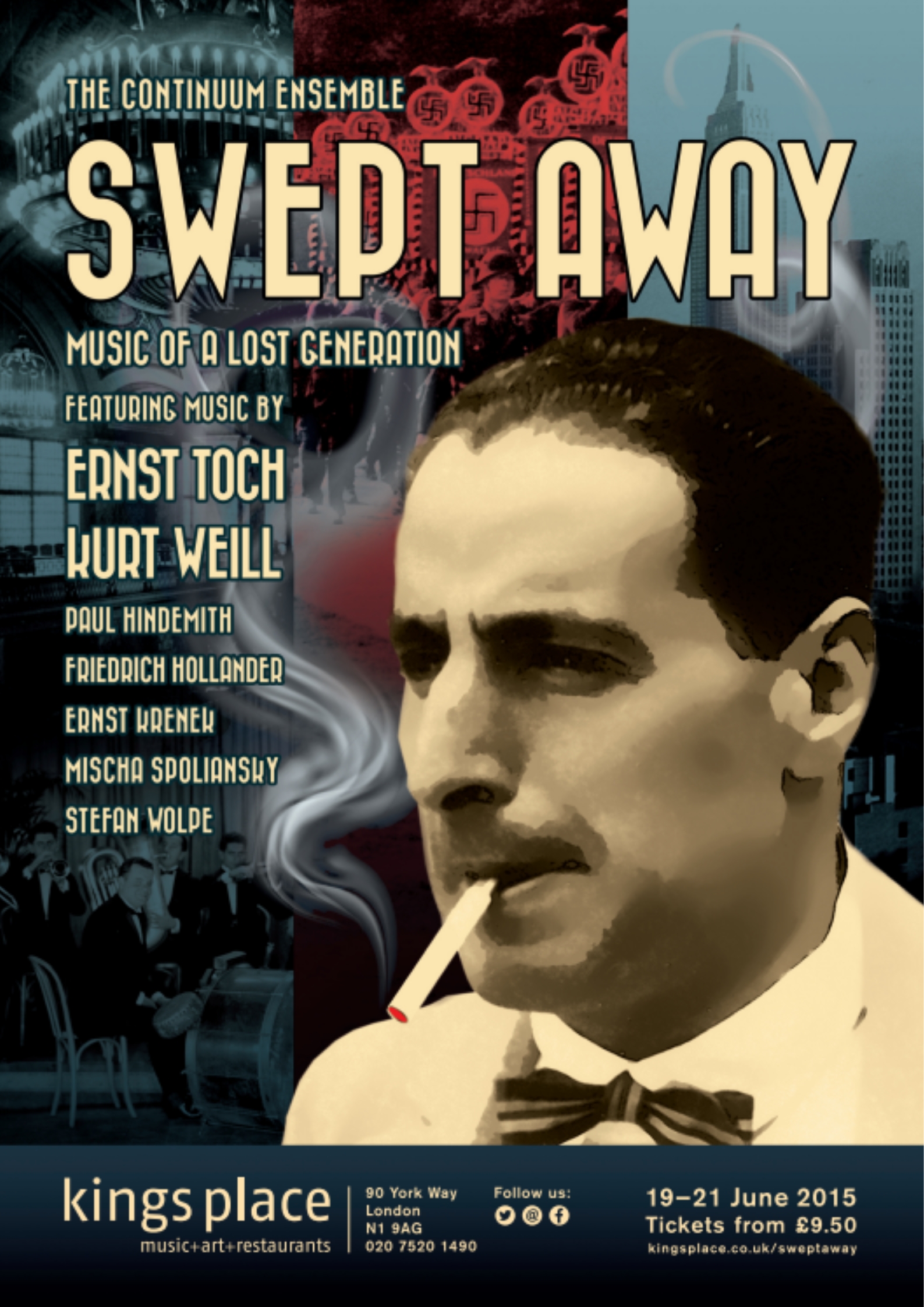Swept Away: Music of a Lost Generation
‘Mahagonny Songspiel and Berliner Requiem were brilliantly undertaken, the latter in a programme with the BBC Singers‘
Sunday Times
Conceived, programmed and led in performance by Philip Headlam, the three day festival brought this unjustly neglected music back into the light and revealed its outstanding quality and engaging modernity over five programmes of opera, chamber, choral and orchestral music as well as cabaret-theatre songs alongside pre-concert talks, films and literary readings at Kings Place concert hall, London in June 2015. Eleven pieces were performed in the U.K. for the first time.
Featured were Ernst Toch, hailed as the most promising young German/Austrian composer of the 1920s and Kurt Weill’s music for concert, theatre and radio from the 1920s as well as composers Paul Hindemith, Erwin Schulhoff, Stefan Wolpe, Ernst Krenek and cabaret composers Mischa Spoliansky, Friedrich Hollander and Wilhelm Grosz.
Soloists included sopranos Sarah Tynan, Anna Dennis, Donna Bateman, mezzo sopranos Lucy Schaufer and Martha Jones, tenor Andrew Rees, bass Barnaby Rea, cellist Joseph Spooner, violinist Hugo Ticciati and flautist Lisa Nelsen as well as Douglas Finch, piano. Philip Headlam conducted The Continuum Ensemble and the BBC Singers, broadcast on BBC Radio 3.
Lawrence Weschler, grandson of Ernst Toch, spoke about Toch’s life in Germany and exile in the U.S. Festival patrons were conductors James Conlon and Lawrence Foster and author Daniel Snowman.

Program I – Opera
Paul Hindemith
There and Back (1927)
Ernst Toch
Egon and Emilie (not a Family Drama) (1928)*
Kurt Weill
Vom Tod im Wald op. 23 (1927)
Mahagonny Songspiel (1927)
Program II – Chamber Music
Ernst Toch
Cello Sonata, op. 50 (1929) *
Capriccetti, op. 36 (1925) *
Burleske, op. 31 (1923) *
Violin Sonata, op. 44 (1928) *
Stefan Wolpe
Two Dances (1926)
Erwin Schulhoff
Five Pieces for string quartet (1924)
Paul Hindemith
Eight Pieces for solo flute (1927)
Program III – Choral and ‘Speaking’ Music
Ernst Krenek
Die Jahreszeiten, op. 35 (1925)
Three Pieces for Mixed Chorus, op. 22 (1923) *
Stefan Wolpe
Zwei Chinesische Grabschriften, op. 25 (1937) *
Ernst Toch
Gesprochene Musik (Spoken Music) (1930) *
Kurt Weill
Das Berliner Requiem (1928)
[encore: Ernst Toch: Valse for speaking chorus and percussion (1962)]
Program IV – music for Orchestra
Ernst Toch
Die Chinesische Flöte, op. 29 (1922) *
Miniature Overture (1932) *
Kurt Weill
Violin Concerto, op. 12 (1924)
Program V – Cabaret and Theatre Songs
Mischa Spoliansky
Ich hab, ich bin
l’Heure Bleu
Ich weiss das ist nicht so
Baby, wenn du unartig bist
Die Beste Freundin
Wilhelm Grosz
Bänkel vom Business, op. 31
Friedrich Hollander
Cocktail Song; Und immer noch speil’nse Blues;
Eine Kleine Sehnsucht
Kurt Weill
Wie man sich bettet, so liegt man; Berlin im Licht;
Youkali; Es Regnet
Herbert Zipper
Dachaulied
Herbert Zipper’s Dachaulied, composed while he was a prisoner in the brutal Dachau concentration camp, spread to other camps as inmates were transferred. As no paper or pencils were permitted, Zipper taught it by humming to the inmates.
Set as a sardonic march, its anthem-like quality aided inmates to express feelings of hope and humanity.
Although not a cabaret song, it closed the Swept Away festival as a reminder of what awaited all of the featured composers had they not fled into exile.
- first performance in the U.K.
